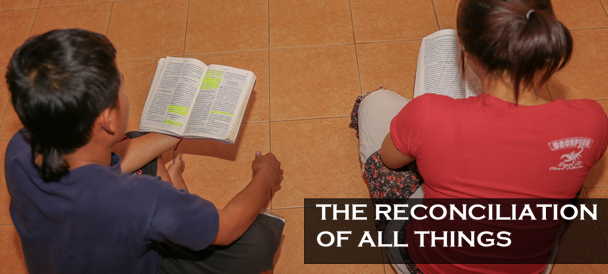Imagine for a moment two close friends that have a falling out. They have an argument that ultimately leaves them estranged and not speaking to each other. Their once close friendship becomes strained, and they slowly drift further apart, gradually becoming strangers.
The only solution to their fractured relationship is reconciliation.
The Bible says that Jesus came to reconcile all things back to Himself (Col. 1:19-20). He came to bridge the gap of separation and bring into harmony a friendship that had been broken by sin. This friendship is every person’s primary relationship, our relationship with God.
Reconciliation to God
Adam and Eve walked in the cool of the morning with God, enjoying a matchless love and intimacy with God. The world, humanity and relationships were “good” just as God had planned. Imagine the conversations, the feelings and the sense of true harmony that must have existed in those moments. However, in a moment of selfish disobedience this harmony was sent spiraling out of control.
When sin entered the scene, the human relationship with God was immediately splintered. People became fearful of God and separated from His direct presence. Romans 5:10 even describes fallen mankind as an “enemy of God.”
You see God is holy and pure, with untainted righteousness. People however, without God are selfish, greedy, lustful, manipulative, and prideful. Our human tendency towards sin is an ugly thing. How could any of us—dirtied and corrupted by sin—stand in the presence of a holy and pure God? This is where the beauty of reconciliation enters.
Reconciliation is, in essence, an enemy standing before God becoming a friend. Jesus’ sacrifice literally allows us an opportunity to move from enemy to friendship. “I no longer call you servants… Instead, I have called you friends” (John 15:15). Through Christ on the cross you and I once again can become restored in our friendship with God and experience unadulterated fellowship with our Creator.
A Human Response
Having sinned, each of us stands condemned, and our only hope is unmerited mercy or grace from God. Jesus has provided the means of redemption, but I must, of my own free will, respond to God’s invitation in order to be saved. Faith which obeys is the condition upon which God promises to save a person. It is a human response to God’s free gift of salvation. We use many terms to describe this process: saved, born again, redeemed, surrendered to Christ… at the heart of these phrases is relationship reconciliation initiated by Christ on the cross and accepted by a sinful individual.
The Uniqueness of the Cross
What makes Christianity and this reconciliation process so unique from other religions? As Nam mentioned in his article Why did Jesus Die?, “In most religions, people are required to sacrifice in order to please the gods,” but in Christianity, God makes the sacrifice on our behalf. In all other religions, we try to clean up our own act and make ourselves righteous or worthy. However, Christianity claims that is a hopeless cause, and we know in our hearts it’s true. The path of self-improvement doesn’t lead to God…it leads nowhere. All other religions require worship, respect and fear of God. Only Christianity claims that there can and should be a mutual love relationship between us and God. Why is Christianity unique? Because of the unrelenting love of God and the eternal sacrifice of Jesus on the cross. Only this love makes the process of reconciling to God possible.
Becoming a New Creation
Reconciliation between God and man is the most obvious relationship restored by Christ on the cross. It is as if we have been chained up by our own mistakes and failures, and Christ is holding out to us the key that will set us free. Those who accept it find freedom, purpose and a restored ability to know and love our creator. But those who refuse it face a life of bondage and separation from Christ. Knowing that Christ loves each of those still-chained-up people enough to die for them must compel us to share the hope and freedom we have with all who will listen. As the apostle Paul encourages in 2 Corinthians 5:17-21:
“Therefore, if anyone is in Christ, the new creation has come: The old has gone, the new is here!All this is from God, who reconciled us to himself through Christ and gave us the ministry of reconciliation:that God was reconciling the world to himself in Christ, not counting people’s sins against them. And he has committed to us the message of reconciliation.We are therefore Christ’s ambassadors, as though God were making his appeal through us. We implore you on Christ’s behalf: Be reconciled to God.God made him who had no sin to be sin for us, so that in him we might become the righteousness of God.”
A Glorious Truth
Our reconciled relationship with God must work itself out in every area of our lives. The Bible makes it clear that if we love God, we will love other people, care for God’s creation, and even think of ourselves differently. Over the next few days we will look more deeply at what reconciliation means in these relationship.
Christian reconciliation is a glorious truth! We were God’s enemies, but are now His friends. We were in a state of condemnation because of our sins, but we are now forgiven. We were at war with God, but now have the peace that transcends all understanding. [1]
[1] http://disciplechristian.com/reconciliation.html


Leave A Comment